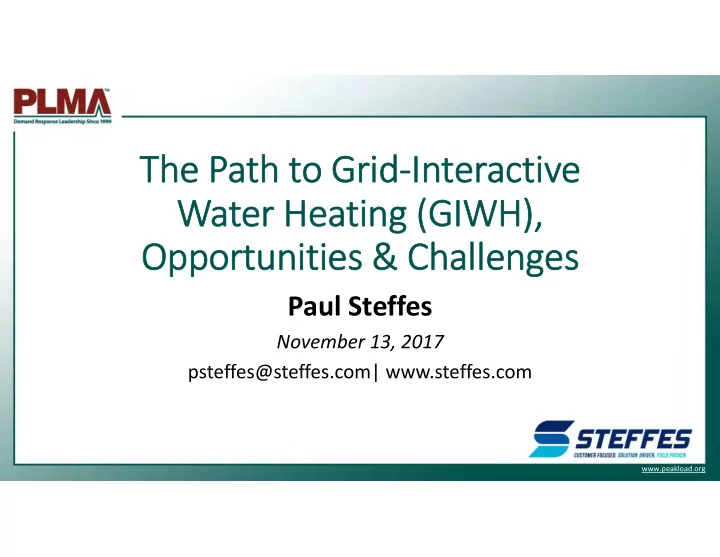

The Path to Grid‐Interactive Water Heating (GIWH), Opportunities & Challenges Paul Steffes November 13, 2017 psteffes@steffes.com| www.steffes.com www.peakload.org
www.peakload.org
41% Electric Water Heat Saturation Northeast: 22% Midwest: 30% West: 26% Hawaii: 60% South: 60% Census Housing Survey Table 2.5 (2010 ) www.peakload.org
Magnitude of Potential 45 Million Water Heaters Total Capacity 4.5kW/ea. 202.5 gW Energy Storage Capacity 12kWh 540 gWh Annual Energy 3800kWh/ea. 171 tWh www.peakload.org
Current Grid Challenges www.peakload.org
Generation Variability Solar Variability Wind Variability www.peakload.org
Roof top solar is going to explode! 2020 www.peakload.org
A Dramatic Evolution: O’ahu’s Load Curve www.peakload.org
CAISO ‐ Impact of PV & Wind to Net Load www.peakload.org
Percent of Negatively Priced Hours Don’t pay others to take your surplus Electricity www.peakload.org
Fast Regulation to balance the Grid Under FERC Order 755, fast acting regulation resources could be compensated at much higher rates than today. www.peakload.org
Great Variability of need for Hot Water www.peakload.org
BPA – Actual kWh / day Single WH over 365 Note: There is greater average daily usage during winter months www.peakload.org
Energy Analysis www.peakload.org
Group of 150 Water Heaters www.peakload.org
What is GETS? www.peakload.org
Electric Thermal Storage(ETS) 10 to 25 kWh Energy Storage 15 to 500 kWh Energy Storage • Largest users of energy in the home 60+% • Have storage capability www.peakload.org
Electric Thermal Storage Electricity is stored as heat in a well insulated brick core. On-board Microprocessor based control system regulates charging and discharging. Internal blower system delivers the heat to the conditioned space as needed to maintain comfort 24/7. It’s FULLY AUTOMATIC Storage occurs based on availability of renewable or off-peak energy or as signaled by the utility for ancillary services. All heating is accomplished by using off-peak or renewable energy www.peakload.org
Grid-interactive Electric Thermal Storage (GETS) Dynamically couples consumer usage to real-time grid needs www.peakload.org
Grid‐interactive ETS (GETS) Provides Grid Reliability, Stabilization, and Optimization Improves System Efficiency Helps Integrate Large Quantities of Renewables Provides Economic Value: Market Price Regulation Services Less renewable curtailment Stops paying to sell renewable energy www.peakload.org
Integration of various groups? www.peakload.org
www.peakload.org
Hydro Plus Solar Water Heater www.peakload.org
Aggregation Cloud www.peakload.org
Grouping of Assets Utility, Billing Node, Substation, Feeder or other Aggregation CLOUD Group #3 Group #1 Group #2 www.peakload.org
Dispatchable Aggregated Resources MW (electric) Charge Rate Coupled to the real‐time needs of grid MW (thermal) Discharge Delivery of hot water MWh (thermal) State of Charge www.peakload.org
Hawaiian Electric’s 1 st BTM Residential Energy Storage 2.2 MW—5MW‐h www.peakload.org
Real‐Time Community Storage Aggregate Control 2.2 MW—5MW‐h Over 100 water heaters acting in concert to provide predictable, precision control www.peakload.org
Real‐Time Community Storage Aggregate Control 5.4MW—42MW‐h www.peakload.org
Economic Value www.peakload.org
Sandia – Energy Storage Costs www.peakload.org
Car vs GETS vs Battery Nissan Leaf • 9.5 kWh / day Tesla Battery • ~$30,000 • 7 kWh • ~$6,500 Steffes Hydro Plus • 10 kWh / day • ~$1,500 www.peakload.org
Value of LMP optimization and fast regulation www.peakload.org
Why is GETS technology important? WIN‐WIN‐WIN Consumer, Utility, Environment • Saves consumers money • Provides fast regulation • Better uses existing utility infrastructure • Integrates large quantities of renewable • Reduces GHG’s • Cost‐effective Energy Storage www.peakload.org
Steffes “Commitment to Innovation” Paul Steffes, Founder Steffes LLC 3050 North Highway 22 Dickinson, ND 58601 701 483 5400 psteffes@steffes.com www.peakload.org
Recommend
More recommend